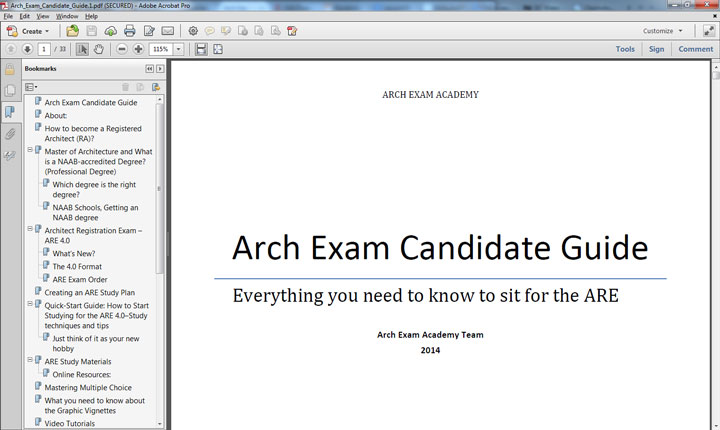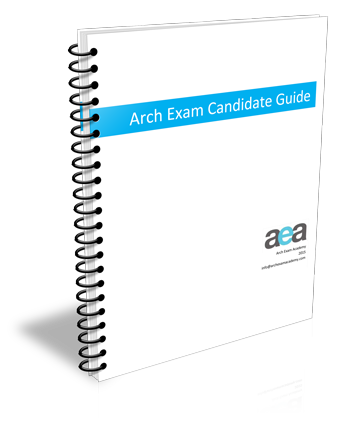Just think of it as your new hobby
The AREs involve a large time commitment. That’s why some a lot of good design professionals haven’t taken the time to get registered, even though they may be doing the day to day work of an architect. Use these tried and true tips to create a plan of action and start the commitment to study for the ARE.
1. Start with an exam schedule. Use the concept in the sample calendar on Creating an ARE Study Plan and make your own starting with today’s date. Next make adjustments for your life events that you can’t miss: holiday weekends, birthdays, etc. These will give you some small interspersed breaks from studying. Finally, look at your new pattern of days for studying and days off. Find the largest blocks of continuous studying and fit in a few “free days.” Even if you substitute some free days for others, you will at least have an accurate estimate of when you will take your tests and when you will be done. Giving yourself a realistic estimate creates an attainable goal to meet or even improve upon.
2. Know your most successful study habits and build a Weekly Study Schedule into your Study Plan. If you are most clear in the morning, set your alarm clock for two hours early three days a week to carve out some time for your studying. If you do better in the evening, it is best to separate yourself from your workday with some food and friends or family time in the early evening and dedicate a time slot like 9pm to 11pm at least three days a week. Try to spend an hour after studying working on a hobby or light reading for fun so you give your brain some time to soak in what you’ve studied before bed. For weekends, or if you have the luxury of being unemployed while you are studying for your exams, you can accelerate your study plan and exam schedule by setting up a morning and afternoon study sessions broken up by exercise or other form of mental distraction to keep the mind sharp and help your brain absorb what you are studying. Give yourself a goal of total study hours for each week and divide the hours into 2 hour (minimum) sessions throughout the week.
Example – 15hrs/week
Mon – 5-7am
Tues – 8-10pm
Wed – day off
Thurs – 5-7 am
Fri – 8-10pm
Sat – 8-11am ; 4-6pm
Sun – morning off ; 3-6pm
3. Sticking to your study plan and exam schedule are the most important things you can do to pass the tests. Once you feel prepared, there are various techniques for the days and hours approaching the exam. Usually you should feel prepared at least three study sessions/days before your test so you don’t feel like you are gathering information up until the last minute. For some people, reviewing flash cards of summary sheets in the day before the test is a good technique. Alternately, people take the exams first thing in the morning to assure their mind is well rested, or take the exams in the afternoon after getting some form of exercise in the morning to help the mind be alert – but not reviewing or thinking about the subject material right before the exam.
4. Keep your confidence up, and make sure you’re prepared. If you sway from your study plan by not getting all of your hours in your weekly exam schedule, or just don’t quite feel like you’re going to be prepared by your estimated date – schedule it out a week or two. Don’t be so hard on yourself that you rush the process.
5. Be prepared that you might fail one or more tests. Giving yourself appropriate study time and feeling confident drastically reduce this possibility, but not passing every test you take on the first try is nothing to be bothered by. You can take other tests in the interim of the six month waiting period.
At The Testing Center
Do good things for your mind and body in the days leading up to the test. Eat lots of fresh vegetables and protein, moderate your gluten, sugar and dairy and stay hydrated. Exercise and allow your mind to have some attention away from the subject matter you’ve spent a month pouring over. Bring food to the testing center because you will burn a lot of energy taking the tests, even though you won’t be physically moving much.
Don’t psych yourself out by thinking about how much the registration means in your life, or how you really don’t want to pay the money to take the test again. Anytime these thoughts creep into your head, just replace them with thoughts of specific details of material you know and are prepared for on your upcoming test. Equally, if you don’t feel prepared and can’t reschedule your exam, focus only on the material that you do know instead of fretting over what more you could’ve done. Be reassured that you can’t know all of the material when going into the exam, and guessing at some items is inevitable. Just stay cool and focus on the task at hand.

Find out more with our ARE Candidate Guide, get it free by signing up for our mailing list, its a helpful guide if you are just starting with the ARE. Sign up for free PDF download, link will be send to you via email.


